Saving time
Posted by Mad Mitch on UTC 2016-05-08 12:34 Updated on UTC 2016-12-11
The following is an extract from a letter written by the Austrian writer Friedrich Torberg (1908-1979) to his fellow Austrian Victor von Kahler. Torberg's works were banned by the Nazis in 1933. After the Nazi Anschluss of Austria in 1938 he embarked on a long emigration journey that took him to Hollywood (1940) and then New York (1944). He took American citizenship in 1945 and finally returned to his beloved Vienna in 1951.
New York, 31 July 1949
The Riffian sheikh Fladshi Achmed Abbas had given valuable assistance to the French in their colonial war against Abd el-Krim (at the end of the twenties) and he was not only praised and decorated by them but also invited to visit Paris.
As a further honour the Governor of Morocco offered him the use of a private aeroplane.
Achmed Abbas refused the honour – not out of fear or anything like that, but only because he didn't understand what use an aeroplane would be. Don't we have ships anymore to sail across the oceans? 'Certainly, my friend', said the Governor, 'but just think: going by ship from Marrakesh to Marseille will take you 40 hours – with a plane you will be in Paris in four hours!'
This information only strengthened the Sheikh's resistance. He stroked his beard. 'And what, Effendi' he asked, 'happens with the remaining 36 hours?'.
And this, my reflective reader, is – as we Yankees say – the point.
This is the true curse of technology: that it saves us time and out of the saved time only bad things arise. I don't know whether Gastein [a thermal baths in the mountains near Salzburg] was only beautiful when one still had to drive up in the horse-drawn omnibus from Lend, and in the Prater [a park in Vienna] ditto ditto in a Fiaker [a two-horse cab] to the Lustschloss [a pavilion in the Prater]. But it was more beautiful.
And not just because it was all more beautiful then, but because the omnibus and the cab were for the task, the function, the meaning of the Gastein landscape and the Prater park more appropriate than the motor car. The motor vehicle – and that means the technology itself – is appropriate, or, as the name implies, suitable, when there is a fire somewhere and the fire brigade in this way can get to it quicker.
But driving to the Lustschloss as though it is in flames and to Gastein as though you are going to arrive late makes no sense. In addition you 'have' less of the Hauptallee [the main thoroughfare in the Viennese Prater] and the Alps. I emphasis the 'have' in quotation marks because it expresses a possession, a relaxing, inner contemplative possession – exactly that which we have lost in the hunt for external things.
And what is all the time that technology has won for us for, if not for 'utility'? And what else is 'utility' other than the increase in paid-for things, external possessions? What happens to the remaining 36 hours other than they are used to earn money or at least to think about how to earn money (or how to save a further 36 hours that can be used for this activity)?
The real tragedy of technologised humans, and specially the Americans, consists in the fact that in the activity of making money they lose every opportunity – yes, the ability itself – to use their money sensibly. If they could still do that there would be a guarantee or at least a solid fifty-fifty chance that they might use the time saved to read, to listen to Caruso records, to play cards or to do some other useless thing – in reality I did not want to fight against technological progress for a single second, but why must it be like this?
This kind of progress ruins my life instead of improving it and attacks those sacred objects that it pretends to preserve. And so it can happen, that in the effort to defend these, that even you, companion from the lost paradise [Austria], are not afraid of using a formulation that it is important 'quickly' to make good Krapfen [doughnuts]. No, it is not important.
We have allowed ourselves to be persuaded that that is what matters, we have been made so servile by technology that we are thankful if we are still allowed to prepare doughnuts (although the time that is necessary could be used 'for something better', couldn't it?) and in gratitude we are even ready to accept the quicker, the 'simpler' and 'more rational' method of preparation, just as long as we get our doughnuts.
What a condition. What a pitiful, inhuman condition.
And it doesn't even matter if the doughnuts happen to be better when they are made in the new way. I support the old way, just because it takes longer. One should not cook 'quickly'. It is only one step from quickly produced doughnuts to Campbell tins...
Of course it is clear to me that I am fighting on the losing side here. I'm not really fighting at all. I feel I am merely occupied by the enemy and that I will not be a collaborateur who is ready to submit to their orders or to be enthusiastic about their measures. When I have no other option I use their measures, but unwillingly. And when they give me doughnuts to eat, I eat their doughnuts. I know that under such circumstances I am still fortunate to be allowed to eat doughnuts at all.
Torberg, Friedrich et al. Kaffeehaus War überall: Briefwechsel Mit Käuzen Und Originalen. München: Langen Müller, 1982. Gesammelte Werke in Einzelausgaben / Friedrich Torberg Bd. 13. Translation©figures-of-speech.
Footnote
Seventy years after Torberg wrote this letter, seventy years of intense technological progress, we can now just get our doughnuts out of an automated dispenser in the wall.
Update 11.12.2016
Since the glorious days of which Torberg writes, when Bad Gastein, the Austrian spa town, was best visited using an open, horse-drawn carriage, things have changed.
Nowadays the town is falling to pieces, the massive blocks and imposing hotel buildings are almost all empty and abandoned.
Karin Hofer of the Neue Zürcher Zeitung visited Bad Gastein recently and published a photo-documenation of its seedy present. Here are just a few of the images – there are more in the source article. Friedrich Torberg would be very sad to see these.
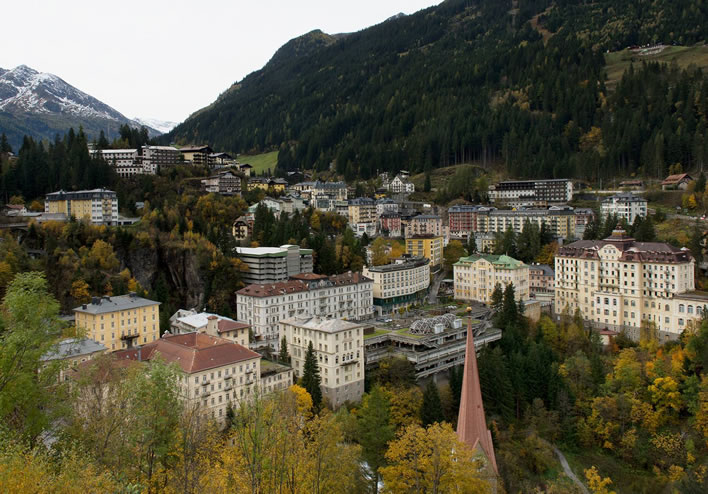
Bad Gastein now looks like an East European workers' suburb of the 1960s. Image: ©Karin Hofer/NZZ
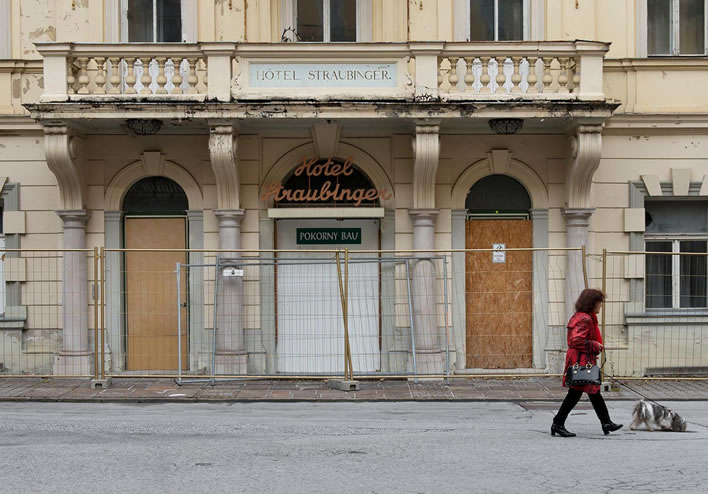
The Hotel Straubinger is now empty and abandoned. Image: ©Karin Hofer/NZZ
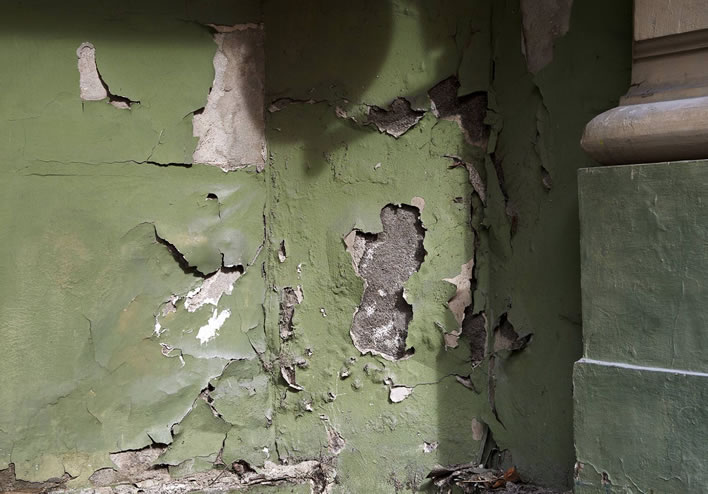
Flaking paint and plaster on the facade of the Hotel Staubinger, once the largest hotel in the town. Image: ©Karin Hofer/NZZ
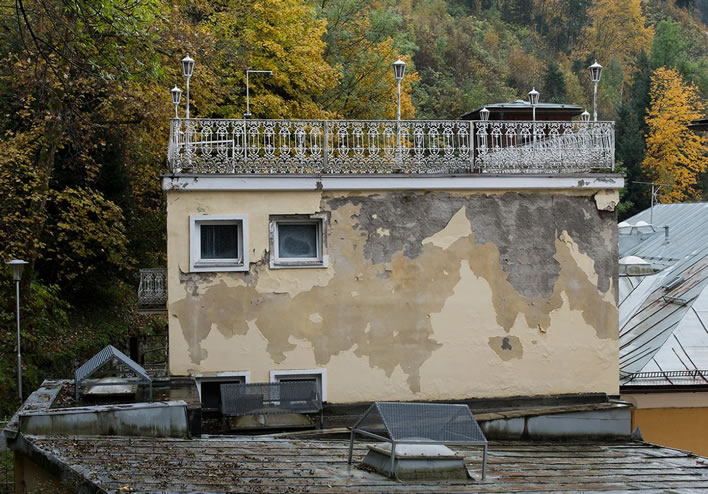
A large part of the town centre is now unoccupied. Image: ©Karin Hofer/NZZ
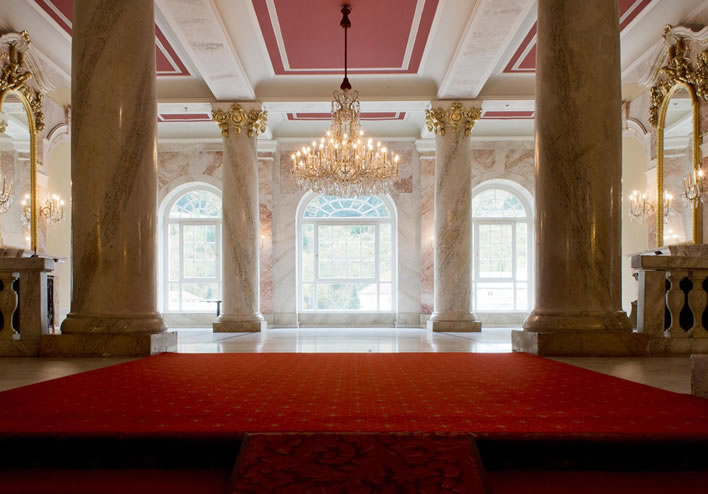
The 'Grand Hotel de l'Europe' (built 1906-9). Image: ©Karin Hofer/NZZ
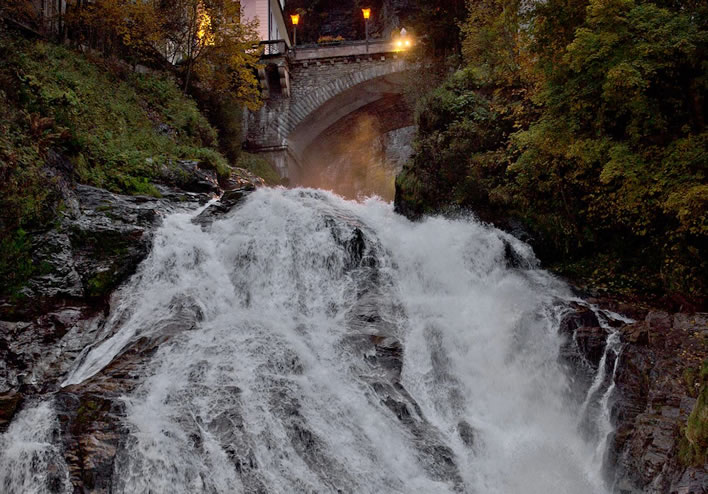
The Gastein waterfall drops from the centre of the town down to the valley. Image: ©Karin Hofer/NZZ
0 Comments UTC Loaded:
Input rules for comments: No HTML, no images. Comments can be nested to a depth of eight. Surround a long quotation with curly braces: {blockquote}. Well-formed URLs will be rendered as links automatically. Do not click on links unless you are confident that they are safe. You have been warned!